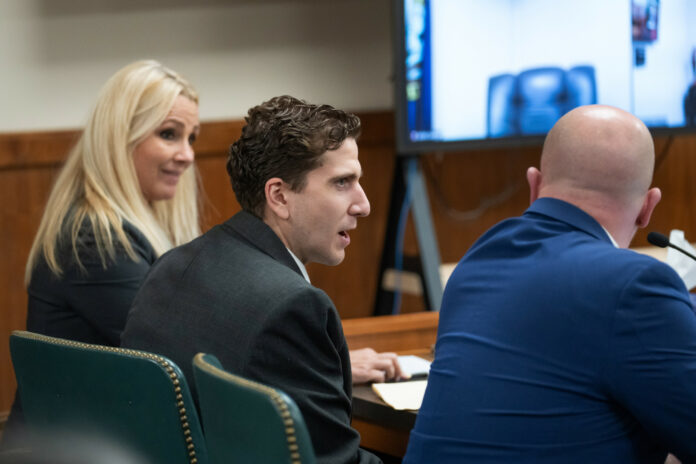New information in the Idaho murders case raises key questions about the evidence being used against suspect Bryan Kohberger.
In a hearing on April 10, Latah County Prosecutor Bill Thompson questioned a defense expert hired by Kohberger’s legal team about recent survey questions conducted among possible jury members.
“You acknowledged, false, that Mr. Kohberger allegedly stalked one of the victims. That’s false. You know that to be false,” Thompson said. The defense expert confirmed that the information was false.
Kohberger, 29, was arrested in December 2022 and charged with four counts of murder in the first degree and one count of felony burglary in the fatal stabbings of Kaylee Goncalves, 21; Madison Mogen, 21; Xana Kernodle, 20; and Ethan Chapin, 20. Kohberger has maintained his innocence in the case. He remained silent during his arraignment, allowing Judge John Judge to enter not-guilty pleas for each of the charges.
The information disclosed in the hearing raises questions about past evidence mentioned in the affidavit used to arrest Kohberger, which said his cellphone pinged cell towers that provided coverage to the 1122 King Road residence where the bodies were found at least 12 times prior to the murders.
Ted S. Warren-Pool/Getty Images/Getty Images
The affidavit said Kohberger’s phone was either turned off or on airplane mode around the time of the killings, but that the data right before it was turned off suggested he was heading in the direction of the home, and the data after it was turned back on suggested he was heading away from the residence.
Jennifer Coffindaffer, a former FBI agent, told Newsweek, “The inference [from the affidavit] was that Bryan Kohberger was in that area for a very specific reason at those late hours of the evening to essentially survey that house or somebody.”
She added that the affidavit did not say Kohberger stalked one of the victims.
“I think there is a distinction though between stalking, like an individual, as opposed to surveilling the location where you intend to commit a crime,” Coffindaffer said. “And I don’t know if they’ve been able to prove—it certainly didn’t come out in the probable-cause affidavit—that he specifically stalked underneath the definition of having an obsession with an individual and pursing them, relentlessly pursuing them.”
Earlier in April, Anne Taylor, Kohberger’s attorney, faced criticism from the prosecution over survey questions she asked potential jurors, in her efforts to move the case out of Latah County. Taylor said the jury results showed that the possible jury pool in the county was biased. Newsweek has contacted Taylor’s and Thompson’s offices for comment via email.
Thompson criticized the survey questions, saying possible jurors had been “injected” with certain information about the case and that the survey could not stand.
One of the questions included in the survey asked potential jurors whether they had read, heard or seen any information relating to Kohberger possibly stalking one of the victims.
Uncommon Knowledge
Newsweek is committed to challenging conventional wisdom and finding connections in the search for common ground.
Newsweek is committed to challenging conventional wisdom and finding connections in the search for common ground.


